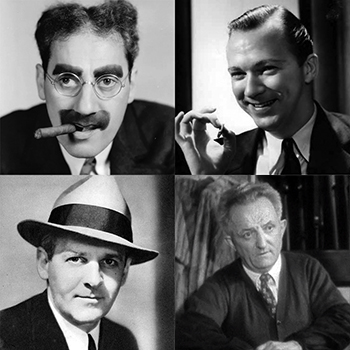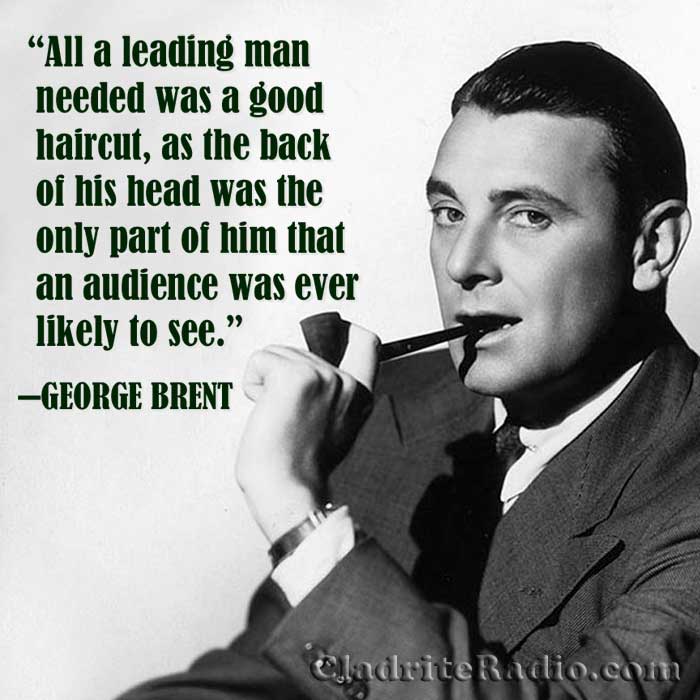Here are 10 things you should know about Robert Williams, born 128 years ago today. He remains one of Hollywood’s most intriguing and tragic “what if?” stories.
Tag: Abie’s Irish Rose
10 Things You Should Know About Natalie Moorhead
Here are 10 things you should know about Natalie Moorhead, born 119 years ago today. She spent a dozen years in Hollywood and then stepped out of the spotlight.
In Search of the Mysterious Mr. Moskowitz
 One of the joys of being an old-movie buff is when an actor in a bit part sparks your interest and you start to do a little research on him or her, which causes you to tumble down a rabbit hole of odd facts and coincidences. Sometimes one finds unlikely connections between that unfamiliar performer and some much bigger names—such as when, say, Groucho Marx, Lee Tracy, and Walter Winchell have a connection to…Milton Wallace?
One of the joys of being an old-movie buff is when an actor in a bit part sparks your interest and you start to do a little research on him or her, which causes you to tumble down a rabbit hole of odd facts and coincidences. Sometimes one finds unlikely connections between that unfamiliar performer and some much bigger names—such as when, say, Groucho Marx, Lee Tracy, and Walter Winchell have a connection to…Milton Wallace?
We recently attended a screening of Blessed Event (1932), a classic precode comedy in which Lee Tracy plays a character that was obviously inspired by gossip columnist Walter Winchell, who was all the rage back then.
We were especially excited to attend the screening, as we had been informed that some footage that had long since been excised from the picture had been restored. Reportedly, it had been there all along, but only in the print that belonged to the Library of Congress. Virtually no one knew about it till Bruce Goldstein, director of repertory programming at NYC’s Film Forum, screened the print at the TCM film festival and realized what a find he’d uncovered.
For those not familiar with Winchell, we’ll catch you up just a bit: A former vaudevillian, he turned to a scandal-mongering form of journalism when his performing career wound down. His popular newspaper column was syndicated and he had a huge following on national radio, too. He was known for coining any number of phrases still used today, including the above-cited “blessed event” used to signal the pending birth of a baby (the guardians of broadcasting decency in those days were convinced that American ears were too tender for that oh-so-coarse term “pregnant”).
Winchell’s broadcasts included remotely broadcast performances by bands and singers around the country, and right before switching to those remote locations, he would blow a siren whistle and say, “Okay, America!”
In the film, as the title suggests, Tracy’s Winchell-esque character relies on the same “blessed event” catchphrase that Winchell used. But in the restored scene, a short, middle-aged, somewhat stereotypical (though not, in our opinion, disparagingly so) Jewish man, played by one Milton Wallace, shows up at the newspaper office to give Tracy a “blessed event” tip: He, Mr. Moskowitz, and his wife are soon going to have their seventh child and he thinks maybe Tracy would want to put that into his column.
Happy 112th Birthday, George Brent!
George Brent, born George Brendan Nolan 112 years today in Ballinasloe, County Galway, Ireland, enjoyed an odd sort of career. By any measure, he achieved great success, but outside movie-buff circles, he’s all but forgotten today. Odd, considering that when he arrived in Hollywood, he was touted as the next Clark Gable. The comparison seems almost laughable today, so low-key was Brent compared to the man once known as the King of Hollywood.
George Brent was a rebel during the Irish War of Independence, though how active he was is open to question; he acknowledged having served as a courier for IRA leader Michael Collins. In any case, the British government put a price on his head, at which point Brent (then Nolan) saw fit to hightail it to the United States.
Brent started his career in the theatre, touring in a production of Abie’s Irish Rose and acting in stock theatre around the country. In 1927, he debuted on Broadway in Love, Honor and Obey. Also in the cast? None other than Clark Gable.
Brent headed for Hollywood a couple of years later, appearing in minor roles for Universal and Fox before signing a contract with Warner Brothers in 1932. It was at Warners that Brent achieved his greatest success. Perhaps the greatest strength of his low-key (but hardly milquetoast) on-screen persona was that he was a perfect complement to strong leading women, holding his own but never overshadowing them.

Given how little he’s remembered today, it’s remarkable to consider how often George Brent worked with some of the most iconic actresses of the Golden Age of Hollywood. He made eleven features with Bette Davis (enjoying an offscreen romance with her as well), six with Kay Francis, five with Barbara Stanwyck, four with Ruth Chatterton (to whom he was married from 1932–1934) and two with Myrna Loy. He also played opposite Ruby Keeler, Greta Garbo, Ginger Rogers, Madeleine Carroll, Jean Arthur, Merle Oberon, Ann Sheridan (to whom he was married from 1942–1943), Joan Fontaine, Claudette Colbert, Dorothy McGuire, Loretta Young, Lucille Ball and Yvonne De Carlo. That’s a line-up of costars that any leading man might envy.
By the late 1940s, Brent was appearing in mostly B pictures, and he retired from films in 1953, though he continued to act on television for another seven years. He was married five times, and if you read some of his early interviews, it’s not hard to see why most of those marriages didn’t work out. Brent clearly had no interest in being tied down and seemed to resent the responsibilities that relationships carried with them. “No woman will ever own me,” Brent once said. “I own myself.”
But he and his fifth wife, former model and dress designer Janet Michaels, were together for 27 years until she passed away in 1974.
George Brent, who suffered in later years from emphysema, died in 1979 in Solana Beach, California.
Happy birthday, Mr. Brent, wherever you may be!
